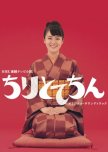
This is when rakugo comes into play. Kiyomi has always relied on her wild and vivid imagination to get away from her humdrum life and before she knows it, she finds herself being engrossed in the rakugo played from the cassette in her grandfather's workshop. Rakugo and laughter have a way of rekindling broken relationships that no word can. Through her bonding with her grandfather and exposure to the enchanting world of imagination named rakugo, Kiyomi gradually comes into her own and decides to stop being Kiyomi B and pursue a career as a rakugo performer.
Acting wise, I'm particularly impressed by Kanjiya Shihori for being able to play a rakogu performer at such a young age (22) and Emi Wakui, showed a new facet of her acting arsenal as a laid-back mother. I like that the series doesn't try too hard to convey a beautiful message about finding your soul like asadora. To add lightness to the series, there are many dream sequences of Kiyomi's fantasy and interludes of her family members reenacting classic rakugo stories. I suspect that part of the reason this series doesn't do too well rating wise (17% on average) is because its theme is rakugo, a 400-year-old tradition that may seem intimidating and old fashioned for the younger viewers in Japan. I consider a series or film to be good when the storytelling is so captivating that it makes you forget your apprehension about a certain theme, and Chiritotechin is one of them.
Esta resenha foi útil para você?












